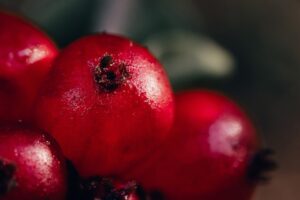Cranberry (V. macrocarpon) Interest goes far beyond a traditional holiday sauce or relish. And for good reason!
Beneficial for preventing urinary tract infections
 A traditional women’s belief (let’s not say old wives’ tale) that cranberry juice can be beneficial for urinary tract infections was discounted by doctors until a study was published in the Journal of the American Medical Association in 1994. But Not So! This placebo-controlled, double-blind trial showed that drinking its juice cocktail definitely reduced elderly women’s risk of urinary tract infection. (Ocean Spray provided both the the juice and the look-alike, taste-alike, cranberry-free placebo juice.)
A traditional women’s belief (let’s not say old wives’ tale) that cranberry juice can be beneficial for urinary tract infections was discounted by doctors until a study was published in the Journal of the American Medical Association in 1994. But Not So! This placebo-controlled, double-blind trial showed that drinking its juice cocktail definitely reduced elderly women’s risk of urinary tract infection. (Ocean Spray provided both the the juice and the look-alike, taste-alike, cranberry-free placebo juice.)
Cranberries are too tart to be palatable without sweetening, but its juice cocktail products have become quite popular. Some people concerned about their intake of sugar have turned to dried cranberry capsules, although there are no studies yet to confirm that these are equally as active as juice.
The part of the plant that is used is the berry. Cranberries are very rich in anthocyanins. They also contain fructose (fruit sugar) and small amounts of vitamin C and fiber. Other constituents include catechins and triterpenoids, as well as malic, citric, and quinic acids. They also contain an unidentified factor that counteracts bacterial chemicals known as adhesins.
Principle use of the mighty Cranberry
The principal use of its juice is to prevent urinary tract infections. The antiadhesin activity of cranberry juice seems to keep bacteria from getting a foothold in the lining of the urinary tract. Some women claim that drinking large quantities of the juice at the first symptoms of cystitis can stop an infection. In most instances, though, once an infection has begun and is causing pain and urgent urination, it requires medical treatment. However, the juice has been used infrequently in conjunction with antibiotics to treat chronic kidney inflammation.
The juice has also been used in nursing homes to keep the urine of incontinent patients from developing an unpleasant ammonia-like smell. Evidently cranberry juice is able to inhibit the growth of the bacteria that degrade urine to ammonia. Test tube research at the University of Wisconsin suggests that cranberry juice may help keep LDL cholesterol from oxidizing. If confirmed, this activity would help prevent the development of cholesterol plaques in arteries.
Dosage
The dose used in the double-blind prevention trial mentioned above was 300 ml (approximately 10 fluid ounces) per day. In acute urinary tract infections, up to 32 fluid ounces daily may be consumed.
Check out more beneficial natural remedies in our index.
